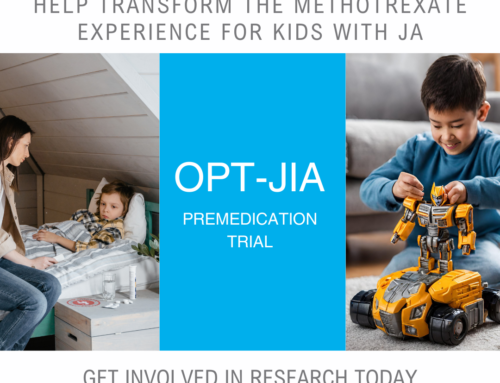#RareFinds w/ @DrPedsRheum
Did you know it can take up to 17 years for research to trickle from journals and publications into your child’s clinic appointment?
When we heard the recent American College of Rheumatology (ACR) Meeting was a “big one for Pediatric Rheumatologists,” we wanted to know why. So we asked Dr. Herman Tam (aka @DrPedsRheum), a specialist at BC Children’s Hospital, to share some of the highlights – in a way we can all understand.
Here’s what Dr. Tam told us he learned at ACR – the largest meeting of rheumatology experts in the world:
New data might change the way we treat kids with pJIA
Dr. Tam heard about a new North American study called CARRA STOP-JIA. In the study, Dr. Kimura, Chief of Pediatric Rheumatology at the Joseph Sanzari Children’s Hospital in New Jersey, looked at three ways to start treatment plans for children with polyarticular JIA (pJIA):
- Step Up: Patients started treatment with a non-biologic DMARD medicine only.
- Early Combination: Patients started treatment with both a non-biologic DMARD and a biologic medicine.
- Biologic First: Patients started treatment with a biologic medicine only.
So what did the study show? In all three groups, results were similar in terms of limiting inflammation and helping kids become symptom free off steroids. But, less than half of the patients became symptom free using any of the options (and not too many parents chose the biologic first option).
How can you use the results? For one, you can be reassured that the treatments available for your child today, for the most part, work! For all three options, kids had less pain and were better able to move after one year. Second, when considering ways to treat your child with pJIA, you can ask about and review the results of this study with your doctor.
Doctors are looking at new targets to help your child have the best life possible.
A Canadian study (ReACCh-Out) presented by Dr. Jaime Guzman, Pediatric Rheumatologist at BC Children’s Hospital, looked at all the ways JIA can negatively impact a child’s quality of life.
So what did the study show? The study found that pain, restrictions on participating in activities and treatment intensity were the most important factors affecting a child’s quality of life.
How can you use the results? Hopefully by working with your medical team to talk about and focus on these specific targets – i.e. making sure your kid can continue doing the things they love, even with modifications; working with your kids to make their treatments as manageable as possible and using strategies to reduce your child’s pain – we can all help give kids the highest quality life possible.
Sometimes medication is a real struggle. Here’s what to watch for.
This study was a big one! In her study, Dr. Alessandra Alongi looked at 8400+ kids over 13,000+ clinic visits in multiple countries to figure out how medication adverse effects (a fancy way of saying nausea, injection pain, missed school days, etc.) really affected kids and if it made them less likely to take their medications.
So what did the study show? Nausea was the most common adverse effect with a high impact on taking medications but not too much impact on a child’s overall quality of life. On the other hand, mood swings, sleep problems and weight gain can have really big impacts on a child’s mental, emotional and social health. All adverse effects can affect a child being able to participate in their school activities and how likely they are to stick with their treatments.
How can you use the results? With nearly 30% of kids and families reporting they experienced adverse effects, it’s important to know that you and your child are not alone in the challenges you may be facing. Most importantly, help is available. Discuss with your rheumatology care team on strategies to mitigate adverse effects, and how you may participate and benefit from research, including this study from Dr. Alongi who cares for kids with arthritis in Italy.
These research findings, along with many others presented, continues to improve our – and your – understanding of JIA. Huge thanks to Dr. Herman Tam (@DrPedsRheum), Pediatric Rheumatologist at BC Children’s Hospital, for helping bring that research into action for you.











Leave A Comment